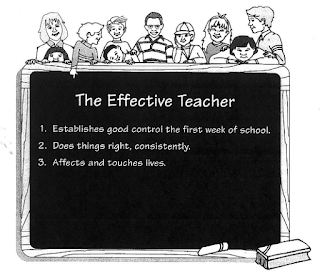The students of Fort Cherry's Agriscience department helped me to create this video and explore their Agriculture Program, FFA, and SAE experiences!
Monday, August 28, 2017
Sunday, August 27, 2017
The Passionate Organizer
There is no secret
that there are many methods to teaching and ways to handle your classroom and
that students will learn from many different types of educators. However, there
are some types of teaching and classroom management that may be more powerful
and effective than others.
No one wants to have
a teacher that is disorganized, dull, and seems more un-interested in the
topics they are teaching than the students that are learning them. Students
want someone in front of the classroom that is organized, has clear objectives
and expectations, and is passionate about the topic and the students. It's good
for teachers to blend teaching methods, such as, power points, marker/chalk
board, group work, questioning, etc. This is great for both the teacher and the
students' sake.
According to
Maryellen Weimer's article there are six keys to classroom excellence:
- Interest and explanation - Be interested in your topic, know what the students understand, and create connections.
- Concern and respect for students and student learning - "Good teaching has nothing to do with making things hard. It has nothing to do with frightening students. It is everything to do with benevolence and humility."
- Appropriate assessment and feedback - Avoid assessments type that force students to memorize material and then regurgitate it for an exam.
- Clear goals and intellectual challenge - Create high expectations for your students and make them clear to your students.
- Independence, control and active engagement - Don't "treat all learners as if they were exactly the same" by creating projects and tasks that allow creativity and student control.
- Learning from students - Be willing to change and take what your students say and use it to reevaluate your teaching methods and classroom management.
It's always
important to make sure you are working to reach every student and as many
different learning styles as you can - while still using your own skill set.
One saying that I keep running across in my classes, reading, and research is
"your students don't care how much you know, until they know how much you
care." I think that it is important to make sure you are constantly making
connections and bonds with students to continue to build a relationship. In the
Agriculture Education spectrum, I think that we also need to remember with
those connections we do not just have students for 1 or 2 years typically - we
hope to have them for 4 years in a high school setting. If we do not build that
relationship, then we lose the students.
I am someone who has
always loved school and learning, loves to be organized, and if anything, I
care too much about others. I will need to work on my enthusiasm. Though, I may
be really interested and excited about a topic, I do not do a very good job of
outwardly expressing it (so tips are welcome!).
"Unit A - The Effective Teacher"
References
Weimer,
Maryellen. “Effective Teaching Strategies: Six Keys to Classroom Excellence.” Faculty Focus | Higher Ed Teaching & Learning, 20 July 2009, www.facultyfocus.com/articles/effective-teaching-strategies/effective-teaching-strategies-six-keys-to-classroom-excellence/.
Pigs, goats, and cats, oh my!
In late June, Mrs.
Hoover and I were able make five Supervised Agriculture Experience (SAE) visits
together. I was able to see market swine, breeding goat, and cat projects
during these visits. This experience was very enriching for me as I have never
worked in AET at all.
First, Mrs. Hoover
and I set off for Fort Cherry High School to get some work done - mail out some
thank you cards, send the chapter member list to the fair, and check on the
progress of the project books we were going to see during our visits.
At the first visit
we looked at three market swine projects where all three students were planning
to show and sell their animal at the Washington County Fair in the middle of
August. We then sat down with all three student and had them pull up their AET
account to check out the progress in their project books. While all three
students had worked on their books, a couple were ahead of the others - which
is okay. Since we made this visit, we were able to catch up all three books to
where they needed to be and fix any glitches.
After lunch, we made
the visit to check on the member with the cat project. She recently graduated
high school and was aspiring to be a Veterinarian Technician. Her books looked
good and Mrs. Hoover talked to her about continuing her project next year so
that she would eligible for locally awarded scholarship money to aid in her
schooling expenses.
The last stop of the
day was to check on some breeding goats. This FFA member recently completed her
freshman year at Fort Cherry, but is not new to animals by any means. Actually,
her family has had a farm for many generations and this is something that she
has been involved in her whole life. Her goats were very well maintained and
were more like dogs than shy farm animals. They did not have their computer
there so that we could check her project book, but since Mrs. Hoover and I
looked at them before we had left the school and hers appeared to be up to
date. Mrs. Hoover told her that they would go over it when school started.
These visits helped
Mrs. Hoover to see the progress the students had made, furthermore, we were
able to give each student insight, tips, and other information to make
improvements to their project books and awards they may be eligible for in the
future.
Subscribe to:
Posts (Atom)





